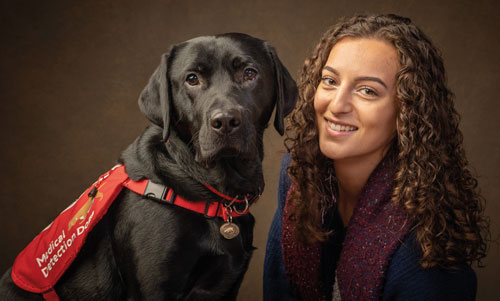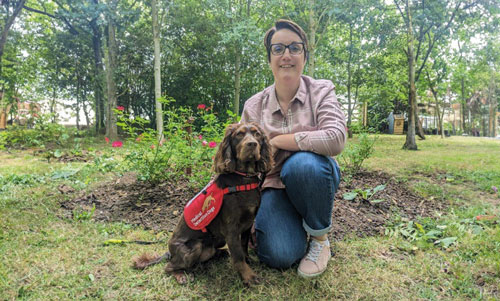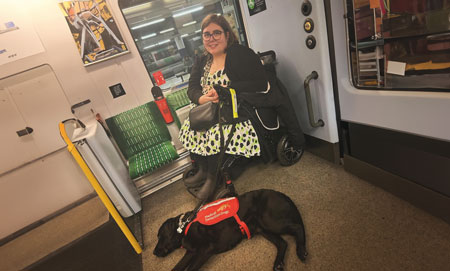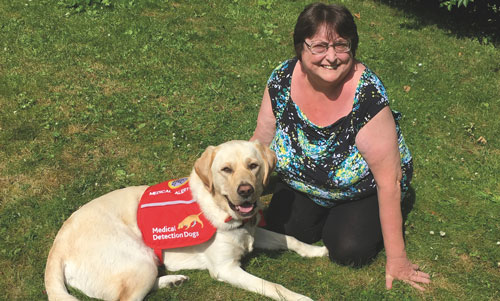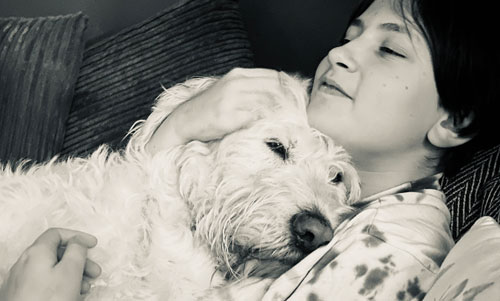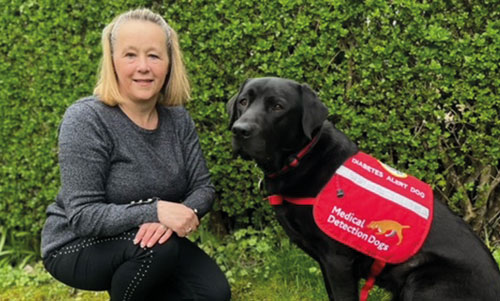How to apply for an Applicant Owned Medical Alert Assistance Dog
Do I meet the eligibility criteria?
If you answer ‘Yes’ to the following statements, it is likely you are eligible to apply for a Medical Alert Assistance Dog.
Location
- You live in the UK – you must reside within England, Wales and Scotland. Please note that we are not currently registered in the Channel Islands or Ireland.
- Due to the impact of the Covid-19 restrictions, at this time we are not able to accept applications from individuals who live too far from our Instructor base – you will be notified when you complete our enquiry form as to whether this applies to you.
Age
- You are aged between 5 years and 75 years. We have found that partnerships over the age of 5 years tend to be more successful, due to the importance of the bond between the dog and the child, which, past experience has shown us, improves the older the child becomes. If your child is 4 years old and has been diagnosed for over 1 year, you can apply before their 5th birthday.
- Please note that we are not currently able to train allergen detection dogs for children under 18 years old.
Medical Condition
- You have been diagnosed with the medical condition for 1 year or longer.
- Due to the impact of the Covid-19 restrictions, at this time we are not able to accept enquiries or applications from individuals who have a medical condition that we have not previously trained a dog to assist with. The conditions we are able to assist with are:
- PoTS
- Primary or secondary adrenal insufficiency, for example Addison’s disease
- Severe Nut allergy
- Mast Cell Activation Syndrome
- Type 1 diabetes – if no CGM device is being used
- CCHS – subject to an individual assessment to confirm viability
- Non-Epileptic Attack Disorder – subject to an individual assessment to confirm eligibility.
- You have little or no warning signs or symptoms to tell you that you are about to have an episode.
- In the case of a diabetic applicant, you are currently testing your blood glucose levels at least 6 times a day.
Commitment/ Availability
- You understand dog ownership is a long-term commitment and doesn’t in anyway replace the need for continued careful management of your condition as advised by your clinicians.
- You are able to travel to the Medical Detection Dogs Centre near Milton Keynes, Buckinghamshire for some training sessions.
- You can commit to regular training and support home visits and to training/handling sessions at the Medical Detection Dogs Centre for the duration of the partnership.
Home and Lifestyle
- You are able to regularly exercise the dog, either on your own or with the support of someone else.
- You have somewhere safe where the dog can toilet – ideally an enclosed garden space.
- You are able to meet the emotional, physical and financial needs of the assistance dog and provide a stable home environment.
- You won’t need to leave the dog alone for more than 3-4 hours per day.
- You are willing to actively participate in the learning process and continued training of the assistance dog, and be capable of managing the dog correctly.
- You have adequate verbal communication to command a dog and be physically able to control a dog (in the case of a child client, with the support of a responsible adult.)
- In your personal situation, you may require some additional support with care and exercising your Medical Alert Assistance Dog.
- However, when in a Medical Alert Assistance Dog partnership, the aim would be for you to carry out the majority of this yourself. This is vital for building a strong bond and good working relationship with your dog and is a long term commitment.
- You are willing and able to complete alerting records and submit these weekly to your Instructor.
- You understand that the Medical Alert Assistance Dog is a working dog, like a Guide Dog or Hearing Dog and would wear a Medical Detection Dogs coat whenever out and about in public to show this. It is important to understand that when you are seen in public with a working dog, you are liable to attract interest in both yourself, your health condition and will be representing Medical Detection Dogs and Assistance Dogs UK.
- You are aware that a Medical Alert Assistance Dog would not be trained to alert you to an oncoming episode whilst travelling in your car.
- You understand that you will not be able to select the colour, sex or breed type for a Medical Alert Assistance Dog.
Who is not eligible to apply?
Medical Detection Dog’s primary focus is to assist individuals who are facing life threatening scenarios on a frequent basis, particularly individuals who live alone. Sadly, therefore we are unable to help individuals who may have good hypo awareness/warning signs of an oncoming episode.
Also:
-
We are not currently able to accept applications from applicants with Type 1 diabetes who use any type of Continuous Glucose Monitoring (CGM) device.
-
We are not currently able to accept applications from applicants with a medical condition that we have not previously trained a dog to assist with.
-
Those whose sole reason for applying is epilepsy, autism, dementia or mental health issues.
-
People under 5 years old or over 75 years old.
- Due to the possible detrimental impact on the dogs’ olfaction (sense of smell), we have a no smoking policy and are not able to place a dog in a household where there are smokers residing. With regards to e-cigarettes/vaping, we are not able to place a dog with a client who uses e-cigarettes/vapes. In the case of a member of the household using e-cigarettes/vaping, we would review this on a case-by-case basis.
Applicant Owned dogs:
- Dogs must be under 2 years old to be considered for training.
- Dogs must not be a guarding or fighting breed, or in some circumstances herding breeds.
Can you care for a Medical Alert Assistance Dog?
- Your dog will need to accompany you as much of the time as is possible.
- You will need to exercise your dog every day, either on your own or with someone to help you.
- You will need somewhere safe and enclosed for your dog to toilet.
- You will need to be available to attend a Centre pre-training period, a placement and regular aftercare visits.
Dog Ownership
Aftercare
In order to ensure that applicants are fully equipped to manage and handle a Medical Alert Assistance Dog in all situations, we offer comprehensive training and support to our clients prior to being partnered with a dog. We also provide ongoing aftercare services throughout the duration of the partnership, as and when required. This will entail training visits at our Centre near Milton Keynes and support visits in the home.
- Pre-placement – handling days at the Centre. Some may require an overnight stay.
- Placement – Staying close to the Centre for a 3 day period.
- Home visits
- Aftercare – Refresher training days at the Centre, as required.
We provide ongoing advice and support for the lifetime of the Partnership which will include regular aftercare visits. These visits ensure that your dog continues to work well and to help you with any problems that may occur. This will include:
- Approximately 10 visits in the first year.
- A visit 6 months after accreditation.
- Thereafter, re-accreditation visits annually at your home for the duration of the partnership.
- Refresher workshops at Medical Detection Dogs Centre.
Retirement
- A Medical Alert Assistance Dog partnership will last as long as the dog is fit, healthy and able to fulfil the tasks of an assistance dog and you are able to provide the necessary care for the dog.
- The age of a dog’s retirement is agreed on an individual case by case basis.
- Medical Detection Dogs is committed to ensuring our dogs are happy and contented and the dogs will remain with you until they pass away.
- As your dog starts to age, we will be in discussion with you as to whether we agree a successor dog is appropriate.Timing of a successor dog is a very individual decision and can be whilst your other dog is still with you, or after they have passed away.
- Please be aware that a reassessment of your eligibility will take place at that time.
Other dogs/pets in the home
- We are not able to place a Medical Alert Assistance Dog in a household with more than 2 dogs.
- In households where up to 2 dogs reside, before we could confirm whether we would be able to place a Medical Alert Assistance Dog, a thorough assessment of the dogs would be carried out. This is to ensure that the alerting potential of any Medical Alert Assistance Dog would not be detrimentally impacted due to distraction or inhibition reasons. If found to be the case, sadly we may not be able to progress the application any further.
- A thorough assessment of any other pets in the household would be made prior to placing a dog.
OTHER IMPORTANT INFORMATION
- Please be aware that we are not under any circumstances able to make any guarantees with regards to a dog alerting you whilst you are travelling in the car and therefore having a Medical Alert Assistance dog does not have any impact on whether or not you are able to retain your driving licence.
- To make you aware, we are still a developing charity, with limited staff, resources and funds. This, along with the lengthy list of applicants awaiting interview and to be matched with dogs means that there will be waiting times in the application process. However, our waiting times are dependent on priority of need and we endeavour to place dogs where they can bring the most benefit, where applicants are facing extreme, life threatening medical episodes that result in collapse, blackouts and hospitalisation and who live alone. We aim to partner any applicants who fit these above criteria with a dog within approximately 18 months. However, this is dependent on how much handling practice an individual applicant may need and on the type of dog that they require. For example, some applicants can only be matched with a small breed type which we do have fewer of within our socialising programme.
- Any applicant applying to us will, in the majority of cases, attend an ‘Applicant Awareness Day’ at the Centre. This will be an opportunity for you to learn more about the process. A date will be offered to you if we feel you may fit the criteria to apply.
- In very extreme situations, we can try and offer some of the activities that are vital steps in the application process in the applicant’s home, to try and reduce the amount you may have to travel to the Centre. However, unfortunately, with limited funds and resources and a long list of applicants, it is not feasible to do it all from home.
Please note that there are other assistance dog charities within the Assistance Dogs UK organisation who may be better suited to assist you. 

